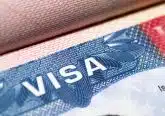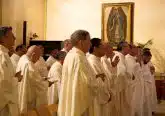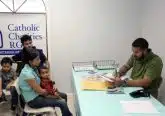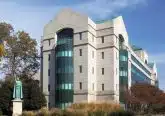El Paso bishop meets with Biden, warns of ‘suffering’ to result from new immigration policy
Washington D.C., Jan 9, 2023 / 14:00 pm
During President Joe Biden’s four-hour visit to the U.S.-Mexico border Sunday he spoke with Bishop Mark Seitz of the Diocese of El Paso, Texas, about the effect the Biden administration’s recent crackdown on immigration will have on migrants.
In a press conference after the visit, Seitz, who is chairman of the U.S. Conference of Catholic Bishops’ (USCCB) Committee on Migration, said he urged the president to consider the effect of the new policy on those seeking asylum in the U.S.
Biden announced Thursday, ahead of his trip to El Paso, that the U.S. will step up enforcement at the border and begin to turn away Cubans, Nicaraguans, and Haitians who try to cross the U.S.-Mexico border illegally.
The new rules would also allow up to 30,000 people from Cuba, Nicaragua, and Haiti to enter the U.S. legally each month. Migrants would be able to come for two years and receive work authorization, provided they have an eligible sponsor and can pass vetting and background checks.
Seitz spoke to Biden during the president’s visit to a migration processing center.
“We tried to bring home the thought that we’re always glad when there’s a new avenue open to receive immigrants that are in need, but we tried to also make a point that there are many people that will find themselves trapped in even worse circumstances because of this new set of guidelines,” Seitz said of his conversation with Biden.
As the bishop of one of the most heavily impacted regions of the country and as chairman of the USCCB’s migrant committee, Seitz has become a leader within the Church and nation articulating the humanitarian response to the migrant surge.
Seitz authored a statement released Friday calling for the Biden administration to “reverse its present course in favor of humane solutions that recognize the God-given dignity of migrants and provide equitable access to immigration and humanitarian pathways.”
Seitz said Sunday that during the president’s visit, he asked Biden to consider those who have risked everything to come to the United States.
“There are the people that are on the journey to the United States and were on the journey already based on the opportunity that they have to find a safe haven in the United States. Now they’re in a terrible situation, they find themselves without a country, they’ve had to leave, very often with threats against their lives. They’ve sold everything they own just to be able to make the trip and made this perilous 3,000-mile journey,” Seitz told members of the press.
“And they finally arrive in Ciudad Juarez, for instance, and then what? Where do they go? So we’re very concerned about these people and their suffering,” he said.
Fernando Ceniceros, director of communications at the Diocese of El Paso, told CNA that during their conversation, Seitz framed the issue as a “pro-life matter.”
Seitz’s message to Biden was “to call attention to the humanitarian side of the crisis” and “that the life of the migrant is a life and should be something that should be valued as a pro-life situation, as a pro-life matter,” Ceniceros said.
Ceniceros said that Seitz handed Biden a Sacred Heart holy card on which a migrant child on the Mexico side had written a prayer to be reunited with her mother and sister on the U.S. side soon.
According to Ceniceros, Seitz and the Diocese of El Paso are hopeful that Biden’s visit to the border will call attention to the plight of the many people “looking for a better opportunity [who] have a legal right to claim asylum here in the United States.”
In recent months the city of El Paso, in far western Texas, has been flooded by record numbers of migrants, many in desperate need of shelter and other humanitarian aid. As thousands have crossed, local authorities have come to increasingly rely on Catholic charitable organizations and the Diocese of El Paso to help shelter and care for the migrants.
“The Catholic Church plays an essential role in providing hospitality to migrants throughout the region,” Dylan Corbett, executive director of a Catholic organization called the Hope Border Institute, told CNA.

Corbett called Biden’s visit a “key moment” for the president to see firsthand “how faith communities are leading the way in meeting the challenges of a broken immigration system.”
“It was key for our border community that Bishop Seitz, as the leader of the bishops’ efforts on migration in the United States, but more importantly as a bishop on the border, to be able to engage the president one-to-one on the need to put into place a safe, effective, humane system at the border and to make immigration reform a reality,” Corbett said.













